Cookies in use
Report
Healthcare Equality Index 2024
Promoting Equitable and Inclusive Care for Lesbian, Gay, Bisexual, Transgender & Queer Patients and Their Families
Published by the Human Rights Campaign Foundation, May 2024

Healthcare Equality Index 2024
Table of Contents
Message from Kelley Robinson
As anti-LGBTQ+ extremists look to strip away healthcare access at every turn, LGBTQ+ people and their loved ones are looking for healthcare providers to offer and champion fully inclusive services, the HRC Foundation's Healthcare Equality Index (HEI) is helping people find facilities where welcoming policies and practices are the standard. For years, our community advocated for cementing healthcare nondiscrimination policy in federal law. In April, the Biden Administration moved to finalize a rule to implement section 1557 of the Affordable Care Act, which will now provide clear protections on the basis of sexual orientation and sex characteristics. Even with this huge step forward, we know that LGBTQ+ people – especially our trans family – continue to face bias-based discrimination in the doctor’s office. No one should have to put their health on the backburner for fear of mistreatment in a healthcare facility or by their doctor. While we’re encouraged that this year’s HEI is record-breaking with more than 1,000 healthcare facilities participating, it’s imperative that healthcare facilities continue working towards comprehensive equity for all patients and healthcare workers. And HRC is here to help in that journey.
Kelley Robinson (She/Her/Hers) , President , Human Rights Campaign Foundation
Why the HEI?
To prevent experiences like these...



Why the HEI
The barriers to healthcare faced by LGBTQ+ Americans highlight a pressing need for improved access and inclusivity within healthcare systems. KFF’s 2023 Racism, Discrimination, and Health survey found LGBT adults are twice as likely as non-LGBT adults to say they have been “treated unfairly or with disrespect by a doctor or healthcare provider” in the last three years.* These findings are similar to a survey by the Center for American Progress, in which 30% of LGBQ respondents and 51% of transgender or non-binary respondents had encountered one or more types of mistreatment or other negative experiences with healthcare providers in the previous year and more than 1 in 5 LGBTQI+ adults postponed healthcare treatment due to disrespect or discrimination by healthcare providers, including more than half of transgender and non-binary individuals.**
By providing resources and recognition to healthcare facilities that prioritize LGBTQ+ patients' needs, the HEI catalyzes positive change within the healthcare sector and can help prevent this type of discrimination from occurring. A key aspect of the HEI includes ensuring compliance with regulations prohibiting discrimination based on sexual orientation and gender identity. This not only fosters a supportive environment for LGBTQ+ patients but also extends protections to employees within healthcare organizations. Furthermore, staff training in LGBTQ+ healthcare needs enhances the quality of care provided, fostering a more inclusive and understanding healthcare environment.
Participating in the HEI not only signifies a commitment to equitable care but also serves as a means for healthcare facilities to access comprehensive resources and support. By encouraging more facilities to engage with the HEI, the healthcare sector can work towards addressing the disparities highlighted in the surveys and fostering a more inclusive healthcare landscape for LGBTQ+ individuals.
In summary, initiatives like the HEI are crucial in addressing the barriers to healthcare faced by LGBTQ+ Americans and promoting inclusivity within healthcare systems. By prioritizing LGBTQ+ patients' needs and ensuring compliance with non-discrimination regulations, healthcare facilities can play a pivotal role in improving access to care and addressing health disparities within the LGBTQ+ community.
____________________________
*LGBT Adults’ Experiences with Discrimination and Health Care Disparities: Findings from the KFF Survey of Racism, Discrimination, and Health. KFF, 2024. Available at: https://www.kff.org/report-sec...
** Discrimination and Barriers to Well-Being: The State of the LGBTQI+ Community in 2022. Chicago. NORC, 2022. Available at: https://www.americanprogress.o...


Executive Summary
Since its inception in 2007, the Healthcare Equality Index (HEI) has been instrumental in transforming how healthcare facilities care for LGBTQ+ individuals. Over the years we have steadily strengthened the HEI criteria and the HEI 2024 once again raised the bar for what it means to be an LGBTQ+ inclusive healthcare facility as this year’s survey was more rigorous than ever.
At the same time, the fight for LGBTQ+ equality in America has never been more important. During the HEI 2024 survey cycle which spanned 2022 and 2023, nearly 900 anti-LGBTQ+ bills were introduced in more than 40 states across the country, and over 100 of them were passed and signed into law. More than a third of these bills explicitly targeted the transgender community, particularly trans and nonbinary youth, with many of these bills aiming to limit or restrict access to gender-affirming care for transgender and nonbinary minors, creating barriers to access safe and age-appropriate medical care. Due to this unprecedented spike in anti-LGBTQ+ legislation across the country, in 2023, for the first time in HRC’s more than 40-year history, we officially declared a state of emergency for LGBTQ+ people in the U.S.
HRC's analysis of the 17th Annual LGBTQ+ Community Survey, fielded in 2023 with over 14,000 LGBTQ+ adults from all 50 states and Washington, DC, found that nearly 80% of LGBTQ+ adults report that these gender-affirming care bans make them feel less safe and 43% of LGBTQ+ adults reported that gender-affirming care bans impact the physical and/or mental health of themselves or their loved ones. The impact of this legislation combined with a history of discrimination in healthcare settings has the potential to cause even more LGBTQ+ people to delay or avoid healthcare settings which makes the work of the HEI even more critical.
Despite the rise in anti-LGBTQ+ legislation and rhetoric, we are pleased to report that healthcare facilities are not backing away from this vital work. For the first time, the HEI 2024 had more than 1000 participants. The HEI 2024 had 1065 healthcare facilities from across the U.S. that stepped up to take the HEI survey and to be measured on how many of the LGBTQ+ inclusive policies and practices they have in place across four criteria areas. This year, 384 participants met the more challenging criteria to earn the top score and the "LGBTQ+ Healthcare Equality Leader" designation, while 462 participants earned the "LGBTQ+ Healthcare Equality High Performer" designation. Combined a total of 79% of participants earned one of these esteemed designations showcasing their commitment to LGBTQ+ patient-centered care.
While there was a slight decrease in the percentage of facilities earning one of these top two designations due to the more rigorous criteria, we saw significant increases in the percentage of facilities adopting several key measures in the HEI, particularly in the area of Patient Self Identification and Data Collection. Detailed adoption percentages for surveyed policies and practices can be found in the report's findings section.
Overall, healthcare facilities nationwide are making significant strides in LGBTQ+ patient-centered care, implementing best practices, and staff training. The HRC Foundation commends participating facilities and encourages non-participants to utilize the HEI to enhance LGBTQ+ care and demonstrate their commitment to LGBTQ+ equity and inclusion.

By The Numbers
HEI 2024 Participants at a Glance


Facilities from 160 different non-profit, for-profit and public health systems participate in the HEI. Systems with 15 or more participating facilities:

Participants by Bed Size

Bed Size Not Predictive of HEI Score
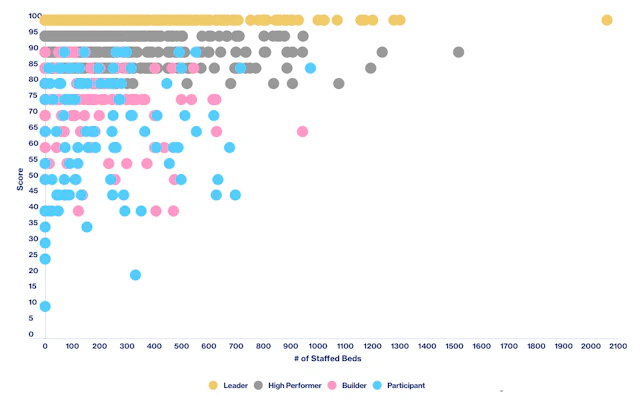


The HEI 2024 LGBTQ+ Healthcare Equality Leaders
HEI participants are given a score based on how many LGBTQ+ inclusive policies and practices they have in place in four different criteria areas. The first criterion consists of the foundational elements of LGBTQ+ patient-centered care. The three remaining criteria are Patient Services and Support, Employee Benefits and Policies, and Patient and Community Engagement. Participants that have earned the LGBTQ+ Healthcare Equality Leader designation have received the highest score in each criterion and have demonstrated that they offer transgender-inclusive healthcare benefits to their employees to receive a top score of 100 points and earn this coveted designation. The criteria were more rigorous this year, challenging participants to reach this designation. Still, an impressive 384 (36%) of HEI 2024 participants met this higher standard and earned the LGBTQ+ Healthcare Equality Leader designation.




State Profiles
While we have seen tremendous progress towards LGBTQ+ equality over the past decade, LGBTQ+ Americans still lack federal civil rights protections. Without these protections, we are left with a patchwork of state and municipal laws that leave many LGBTQ+ people vulnerable to discrimination in their workplaces, healthcare facilities, schools and communities.
This is why the HRC Foundation produces programs like the HEI that promote LGBTQ+ inclusive policies and practices in the institutions that impact people’s everyday lives. This work is most important in states and communities that lack non-discrimination protections for their LGBTQ+ citizens and those that have passed anti-LGBTQ+ legislation that seeks to take away rights and legislate discrimination. Unfortunately, this is happening too often and much of our progress is under siege. In state legislatures across the country, anti-equality politicians have been emboldened by a political climate where hate and discrimination have entered the mainstream and they are working to tear down years of progress on LGBTQ+ rights and inclusion. During the HEI 2024 survey cycle which spanned 2022 and 2023, nearly 900 anti-LGBTQ+ bills were introduced in more than 40 states across the country, and over 100 of them were passed and signed into law.
Fortunately, many healthcare facilities and other institutions are stepping up to provide protections for their LGBTQ+ patients, visitors and employees. It is particularly encouraging to see many healthcare facilities going well beyond the foundational policies promoted by the HEI and embracing a full range of inclusive policies and practices. The following pages profile two states that lack comprehensive LGBTQ+ protections yet have an abundance of healthcare institutions that have stepped up to ensure that the LGBTQ+ people in their states have inclusive and welcoming care when they need it.

Arizona
Arizona is one of two states in the “Building Equality” category in HRC’s 2023 State Equality Index. These states have some LGBTQ+ equality laws and policies in place but still have significant work to be done. For example, Arizona has sexual orientation and gender identity employment non-discrimination protections but does not have these protections in its public accommodation, housing, and education laws. The Grand Canyon State only has a handful of anti-equality laws and policies on the books, however, the ones that they do have are directly related to health such as transgender exclusions in state Medicaid coverage and a ban on gender-affirming surgical care for transgender youth. During the 2022 and 2023 legislative sessions (the HEI 2024 timeframe), 26 anti-LGBTQ+ bills were introduced in Arizona with 4 passing.
Fortunately, LGBTQ+ Arizonans have several hospitals and healthcare facilities throughout the state that have embraced LGBTQ+ inclusion by participating in the HEI. This year Arizona had 33 HEI participants up from 13 participants in 2022, a 153% increase! These new participants were largely driven by increased participation from the Banner Health System as well as first-time participants that are part of CommonSpirit Health. New participant, Yuma Regional Medical Center is the first participant from Southwestern Arizona and the Federally Qualified Health Center (FQHC) Community Health Center of Yavapai is the first participant from Northern Arizona. Longtime Leader Valleywise Health brought its Psychiatric hospital into the HEI for the first time. These facilities joined seasoned participants from the Veterans Health Administration and Mayo Clinic along with El Rio Community Health Center, an FQHC in Tucson.
The impact of our efforts around creating a welcoming environment for all people, through our focus on those often the most marginalized within the LGBTQ+ community has been immense.
From a patient perspective, which is the most important, we have seen greater comfort with the utilization of our services from the community in multiple locations. This has been voiced to us from post-care surveys and patient comments that have been shared with our leadership regarding patient experiences. What's more, we have used these early wins to move forward with building additional infrastructure that will continue to update applicable policies, procedures, and culture within the entire agency around patient care.
From a staff perspective, there has been widespread support from senior leadership that has translated into acceptance of needed changes and signaled safety to staff around the issue of LGBTQ+ equity and inclusion. Our employee resource group continues to be a robust vehicle for support and activities for LGBTQ+ staff and their allies. Requests for training continue to happen across departments and new assigned training happens at a broader scale to empower staff in their tools to equitably treat our patients.
Finally, the community as a whole has noticed our continued efforts, year after year. Anecdotal information advises that our HRT care is more known in the community than before and we recently were honored as one of the 2023 Most Admired Companies Awardees, largely through our efforts on LGBTQ+ equity and inclusion. Valleywise Health is committed to continuing our striving to be ever better each year for our patients, staff, and community. We appreciate HRC's guidance through the HEI to help us on our journey.

North Carolina
North Carolina is one of twenty-three states in the lowest-rated “High Priority to Achieve Basic Equality” category in HRC’s 2023 State Equality Index. These states lack basic LGBTQ+ equality laws and policies, such as non-discrimination protections in employment, housing and public accommodations, and are most likely to have a religious refusal or other anti-LGBTQ+ laws in place. In addition to lacking statewide non-discrimination laws that include sexual orientation and gender identity, the Tar Heel State several anti-equality laws and policies on the books, including a ban on gender affirming care for youth HIV criminalization laws, and laws that require forcible outing of LGBTQ+ youth. During the 2022 and 2023 legislative sessions (the HEI 2024 timeframe), 20 anti-LGBTQ+ bills were introduced in North Carolina with 5 passing.
Fortunately, LGBTQ+ North Carolinians have several hospitals and healthcare facilities throughout the state that have embraced LGBTQ+ inclusion by participating in the HEI. This year North Carolina had 54 HEI participants, an increase of 21 participants over 2022, making it the state with the 4th largest number of participants. With 19 facilities earning the Leader designation, North Carolina also ranks 4th in the number of Leaders per state. These new participants were largely driven by several first time participants from the Atrium Health (now part of Advocate Health) Charlotte region as well as new participants from the Atrium Health Wake Forest Baptist Health System. Western North Carolina Community Health Services was once again a Leader and is the only FQHC from North Carolina to participate. The hospitals from Cone Health returned to the HEI in 2024 and joined longtime participants from Novant Health, Duke Health, UNC Health and the Veteran’s Health Administration.
Novant Health has an LGBTQ+ Community Voice Council that is comprised of patients and leaders of community organizations that advise on Novant Health’s approach to building an inclusive environment for patients who identify as LGBTQ+. The council assesses and provides feedback on health equity efforts and the provision of a remarkable patient experience to the community. This intentional engagement provides meaningful feedback that helps Novant Health gain a better understanding of how to increase access and ensure equitable health outcomes in the LGBTQ+ community. Some examples of leveraging community voice put into practice include enhancements on Novant Health’s physician finder, feedback on the organization’s room sharing policy, and increased provider engagement/education around LGBTQ+ mental health therapy, to name a few.

Findings
THE HEALTHCARE EQUALITY INDEX 2024 ASKED PARTICIPANTS a series of questions about LGBTQ + inclusive policies and practices. Those questions are divided into four criteria outlined in more detail in our HEI Resource Guide. In addition, a fifth criteria section focuses on known activities or policies that may undermine LGBTQ+ equality or patient care.
Responses to the criteria are reported in aggregate to indicate national trends and facilitate benchmarking. Individual facility scores for these criteria can be found online at hrc.org/hei/search.
Criteria 1: Non-Discrimination and Staff Training
● Patient Non-Discrimination
● Equal Visitation
● Employment Non-Discrimination
● Staff Training
Criteria 2: Patient Services and Support
● LGBTQ+ Patient Services and Support
● Transgender Patient Services and Support
● Medical Decision-Making
● Patient Self-Identification and Data Collection
Criteria 3: Employee Benefits and Policies
● Employee Benefits, Policies & Practices
● Transgender-Inclusive Health Insurance
Criteria 4: Patient and Community Engagement
● Patient and Community Engagement
Criteria 5: Responsible Citizenship

Criteria 1: Non-Discrimination and Staff Training
Patient Non-Discrimination
The first section of the HEI Non-Discrimination and Staff Training criteria calls for a written patient non-discrimination policy (or patients’ bill of rights) that includes both “sexual orientation” and “gender identity.” Lesbian, gay, bisexual, transgender, and queer people continue to face discrimination in healthcare because of their sexual orientation and/or gender identity, creating a need for explicit non-discrimination policies. Learn more about this criterion in the HEI Resource Guide.

Equal Visitation
The second section of the HEI Non-Discrimination and Staff Training criteria calls for a written visitation non-discrimination policy or an equal visitation policy. Since 2011, all hospitals that accept Medicare or Medicaid payments have been required to have an equal visitation policy as part of the Conditions of Participation. Learn more about this criterion in the HEI Resource Guide.

Employment Non-Discrimination
The third section of the HEI Non-Discrimination and Staff Training criteria calls for an employment non-discrimination policy (or an equal employment opportunity policy) that includes both “sexual orientation” and “gender identity.” Federal law and most state laws do not protect employees from discrimination based on real or perceived sexual orientation or gender identity. Learn more about this criterion in the HEI Resource Guide.
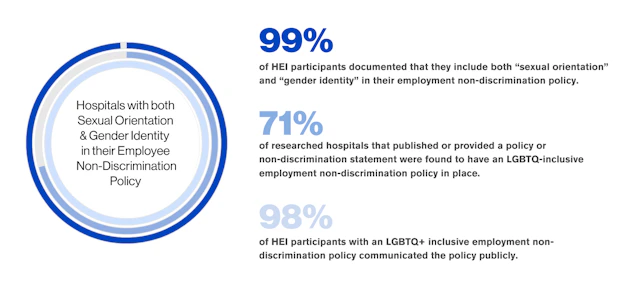
Staff Training in LGBTQ+ Patient-Centered Care
The fourth section of the HEI Non-Discrimination and Staff Training criteria calls for key facility employees to receive expert training in LGBTQ+ patient-centered care. This criterion recognizes that training is critical for policies to be successful and for LGBTQ+ patients to feel welcome. Learn more about this criterion in the HEI Resource Guide.


Criteria 2: Patient Services and Support
LGBTQ+ Patient Services and Support
The first section of the HEI Patient Services and Support criteria asks about key best practices in support of LGBTQ+ patients as a group. This section includes best practices from The Joint Commission and other sources to enhance care for LGBTQ+ patients. Learn more about this criterion in the HEI Resource Guide.
Planning to Serve LGBTQ+ Populations


Serving LGBTQ+ Populations

Communicating with LGBTQ+ Patients

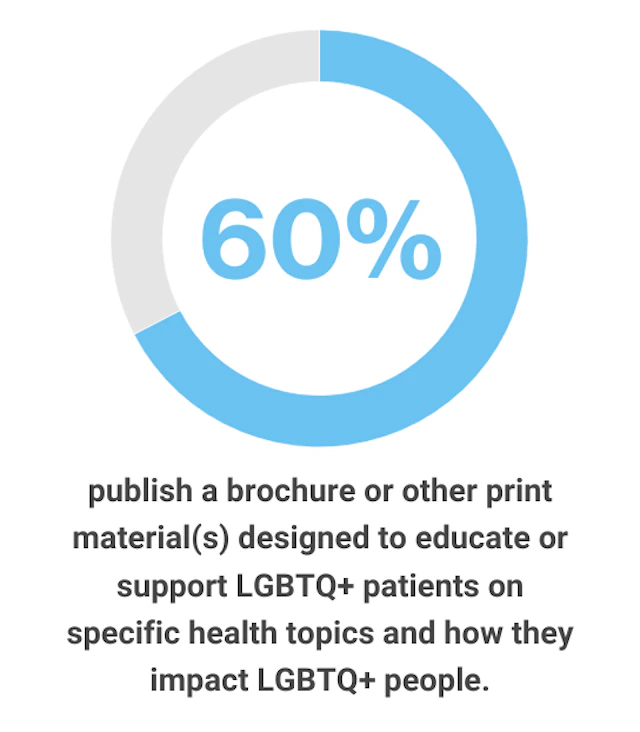

Transgender Patient Services and Support
Transgender patients are particularly vulnerable in healthcare settings. In a 2022 survey of more than 92,000 transgender and nonbinary Americans, 48% of respondents who had seen a provider in the past year reported one or more negative experiences due to their transgender or gender non-conforming status and 24% of respondents reported that they avoided seeking necessary health care when sick or injured in the past year because of fear of being mistreated as a transgender person.*
Learn more about this criterion in the HEI Resource Guide.
* James, S.E., Herman, J.L., Durso, L.E., & Heng-Lehtinen, R. (2024). Early Insights: A Report of the 2022 U.S. Transgender Survey. National Center for Transgender Equality, Washington, DC.
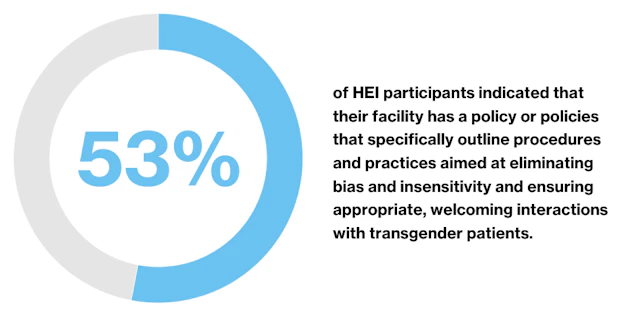
For more information about best practices for care of transgender patients see the publication, Creating Equal Access to Quality Health Care for Transgender Patients: Transgender-Affirming Hospital Policies, from HRC Foundation, Lambda Legal, and the LGBT Rights Committee of the New York City Bar Association.



For more information about best practices for clinics and hospitals that seek to promote the health and well-being of transgender and non-binary youth through the creation of multidisciplinary care clinics see the publication, Comprehensive Care Clinics for Transgender & Non-Binary Youth from the HRC Foundation.

During the HEI 2024 survey cycle which spanned 2022 and 2023, nearly 900 anti-LGBTQ+ bills were introduced in more than 40 states across the country, and over 100 of them were passed and signed into law. More than a third of these bills explicitly targeted the transgender community, particularly trans and nonbinary youth, with many of these bills aiming to limit or restrict access to gender-affirming care for transgender and nonbinary minors, creating barriers to access safe and age-appropriate medical care. In addition, some legislation and administrative actions have also limited gender-affirming care for adults.
Gender-affirming care is age-appropriate care that is medically necessary for the wellbeing of many transgender and non-binary people who experience symptoms of gender dysphoria, or distress that results from having one’s gender identity not match their sex assigned at birth. By preventing doctors from providing this care, these bans prevent transgender youth from accessing medically necessary, safe health care backed by decades of research and supported by every major medical association representing over 1.3 million US doctors.
Healthcare facilities located in states with gender-affirming care bans will have this warning sign on their scorecard in the HEI Search Tool.


Medical Decision-Making
Unfortunately, healthcare organizations have sometimes failed to honor LGBTQ+ patients’ right to designate the person of their choice, including a same-sex partner, to make medical decisions on their behalf should they become incapacitated, even when legally valid medical decision-making documents have been presented.. Learn more about this criterion in the HEI Resource Guide.


Intersex Children
The HEI first asked if hospitals have a policy or official practices related to the treatment of intersex children that delay medically unnecessary procedures until the patient is old enough to make an informed decision in the HEI 2022.
Intersex is an umbrella term that refers to approximately 0.5 to 1.7 percent of the population born with variations in sex characteristics such as chromosomes, gonads, and/or genitals that vary from what is considered typical. Non-medically necessary procedures intended to change the genital appearance and reproductive anatomy to fit arbitrary norms are frequently performed on intersex infants and young children before the child can have a voice in the matter and make an informed decision.
Only 4% of HEI participants have a policy related to postponing medically unnecessary procedures on intersex children.
For more information about best practices for the care of intersex children see the publication, Providing Ethical and Compassionate Health Care to Intersex Patients: Intersex Affirming Hospital Policies written by interACT: Advocates for Intersex Youth, Lambda Legal, and Proskauer Rose LLP.

Patient Self-Identification
Many healthcare authorities such as the Institute of Medicine and The Joint Commission have recommended the routine collection of sexual orientation and gender identity data in healthcare settings for more than a decade. These critical data provide hospitals with information on the potential cultural needs of each patient, as well as an opportunity to monitor and analyze health disparities at the population level. While the HEI has been asking about these data collection practices for years, this year for the first time, this section of the criteria was scored separately and healthcare facilities must have some of these practices in place in order to earn either a High Performer or Leader designation. Learn more about this criterion in the HEI Resource Guide.

This year we saw significant increases in the number of healthcare facilities collecting this important data. For example, the percentage of facilities collecting sexual orientation data increased from 81% in 2022 to 93% in 2024 and pronoun collection and display rose from 44% to 74%. Seven of the eight data points above had double-digit increases.
Patient Self-Identification and Data Collection Training


Criteria 3: Employee Benefits and Policies
LGBTQ+ employees of healthcare organizations play a vital role in ensuring LGBTQ+ patient-centered care by informally educating co-workers about patient concerns, offering feedback about organizational policies and practices, and conveying to the local community the organization's commitment to equality and inclusion. It is critical that LGBTQ+ employees, like LGBTQ+ patients, receive equal treatment, particularly regarding health-related benefits and policies. Learn more about this criterion in the HEI Resource Guide.
Equal Benefits
Competitive employer-provided benefits packages are critical to attracting and retaining talent. Providing LGBTQ employees and their families with inclusive benefits, from healthcare coverage to retirement investments and more, is a low-cost, high-return proposition for businesses. HRC strongly urges employers to maintain domestic partner benefits for their workers going forward as a sign of sustained commitment to family diversity, inclusion and protection of LGBTQ+ employees whose rights outside the workplace are not guaranteed under law in many states. Domestic partner benefits ensure that all employees will be treated equally.
HEI 2024 participants provided the following benefits related to same-sex domestic partners



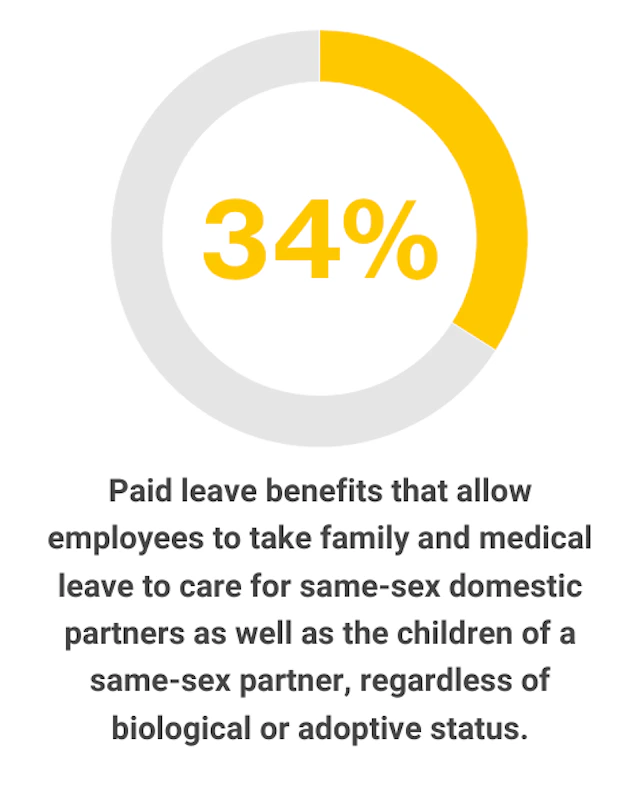
LGBTQ+ Inclusive Family Building Benefits
As societal attitudes towards LGBTQ+ individuals continue to evolve, so too do the pathways to family building within the community. LGBTQ+ inclusive family-building benefits can be an important part of the equation when an individual or couple is seeking to start a family. The HEI added a question about LGBTQ+ inclusive family-building benefits to its scoring criteria for the first time in 2024.

Learn more about the importance of providing LGBTQ+ inclusive family-building benefits in this white paper.

Transgender Inclusive Healthcare Benefits
Access to healthcare benefits that cover gender-affirming care are critical for the health and well-being of transgender people. While there has been an improvement over the past several years, healthcare facilities continue to lag behind their corporate counterparts when it comes to providing this important and necessary benefit. To receive credit for this criterion, which is necessary to obtain HEI Leader status, participants must provide to all employees at least one health plan that explicitly covers medically necessary health services for transgender people, including gender transition-related treatment.
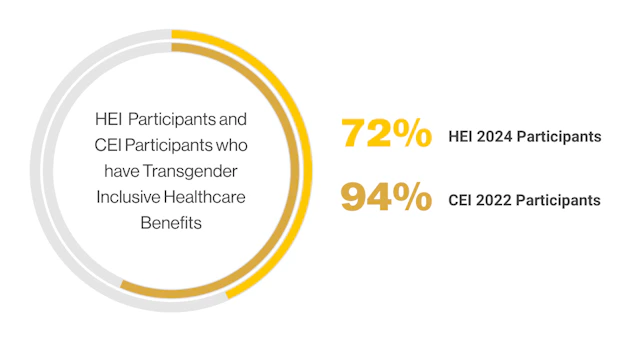
Download our whitepapers for more information on important LGBTQ+ benefits issues:

Other Support for LGBTQ+ Employees
In addition to providing equal benefits, there are a number of other ways that employers can be inclusive of and supportive of their LGBTQ+ employees.

Transition Guidelines
In addition to ensuring healthcare coverage for gender-affirming care, one of the most important policies an employer should have is a set of written gender transition guidelines that document the necessary policies and practices in place to support a respectful and successful workplace transition.

The HRC Foundation’s Transgender Inclusion in the Workplace: A Toolkit for Employers is a comprehensive resource to guide employer transgender inclusion. The toolkit includes HRC’s best practice advice for implementing transgender-inclusive policies and practices (including sample policies) as well as guidance for implementing transgender-inclusive healthcare benefits.

Criteria 4: Patient and Community Engagement
Healthcare organizations can welcome LGBTQ+ people in their service area by implementing community engagement initiatives like those recommended in this section.
LGBTQ+ Community Engagement, Marketing, and Advocacy


Examples of Patient and Community Engagement


Examples of Ads and Logos

28% publicly supported LGBTQ+ equality under the law by speaking out on local, state, or federal legislation or policy initiatives. During the 2022 and 2023 state legislative sessions, nearly 900 anti-LGBTQ bills were introduced around the country. Hospitals and other healthcare providers have been slow to add their voice to those that support LGBTQ+ equality by speaking out against anti-LGBTQ bills in their states or supporting pro-equality legislation.
For more information on LGBTQ+ related legislation in the states, view HRC’s 2023 State Equality Index.


Understanding the Needs of LGBTQ+ Patients and Community
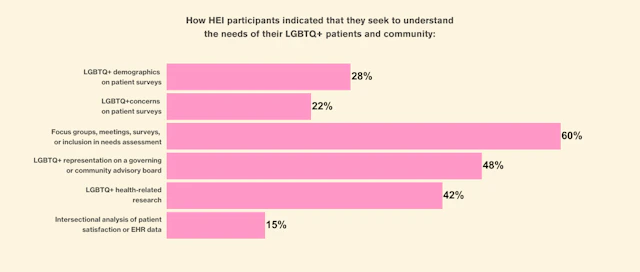
Criteria 5: Responsible Citizenship
This section focuses on known activities that undermine LGBTQ+ equality or patient care. Healthcare organizations can have points deducted from their score if they have policies in place that may lead to discriminatory treatment or a large-scale official or public anti-LGBTQ+ blemish on their recent records. Learn more about this criterion in the HEI Resource Guide.
Major Deductions
The largest deduction of 25 points is for major offenses that come to the attention of the HRC Foundation such as revoking LGBTQ+ inclusive policies and practices or having policies in place and/or engaging in proven practices that are contrary to the organization's written LGBTQ+ patient or employment policies. HRC realizes that no institution is perfect and that situations may arise where an individual or small group act in a way that is not in alignment with the organization’s policies and commitment to LGBTQ+ equality and patient care. This criterion is not intended to penalize an organization in those situations where an isolated negative action takes place, provided that the organization addresses the situation and takes action to ensure that their commitment to LGBTQ+ patient care remains uncompromised. Fortunately, there are currently no healthcare facilities that have received this deduction.
Minor Deductions
In 2022, the HEI introduced a new penalty option under the Responsible Citizenship criteria. This penalty is for organizations that either follow a religious directive or have a policy in place that prevents them from providing specific medically necessary treatments, such as hysterectomy or mastectomy, to some patients based on a diagnosis of gender dysphoria, but allows them to provide the same treatment to other patients based on other diagnoses, this may result in discriminatory treatment that conflicts with their non-discrimination policy.
This year, this penalty was applied to 140 HEI 2024 participants. The majority (97) of these participants are facilities operated by the Veteran’s Health Administration, which due to an exclusion in the VA medical benefits package are unable to provide gender-affirming surgeries. The other group of 43 hospitals that received this penalty are Catholic healthcare facilities that interpret one or more of the Catholic Ethical and Religious Directives in a way that means they will not perform certain gender-affirming surgeries while they would provide the same surgeries for other patients based on other diagnoses.
Organizations with this type of directive or policy in place may only be subject to a five-point deduction (to offset the points received for the Patient Non-Discrimination Policy) if they take certain actions to mitigate the potential for discriminatory situations to occur. These actions include providing a statement on their website about the services that are not provided, having a referral mechanism in place, and communicating this limitation to area surgeons.
After taking these communication steps an organization would only be assessed a 5-point deduction. If after this deduction, the organization has a final score of between 80-95 and meets the other criteria for earning the High Performer designation (full credit in criteria 1 and at least partial credit in criteria sections 2, 3, & 4), the organization may earn the High Performer designation.
This penalty is not applied to healthcare facilities in states that have passed gender-affirming care bans because the limitations in care are due to an external policy from the state rather than an internal policy from within their organization.


About the HRC Foundation Health & Aging Program
The Healthcare Equality Index is a project of the Health & Aging Program at the Human Rights Campaign Foundation. In addition to the HEI, the Health & Aging Program also operates the Long-Term Care Equality Index (LEI) in partnership with SAGE. The Health & Aging Program researches, develops, and advocates for LGBTQ+ health and aging initiatives at the federal, state, and local levels, and provides support to institutions seeking to enhance LGBTQ+ wellbeing via education, policy, research, and technical assistance.
Meet the Health & Aging Team
Tari Hanneman (she/her) is the Director of the Health & Aging Program at the Human Rights Campaign Foundation and the author of the HEI. In addition to managing the development and publication of the Healthcare Equality Index, she oversees other projects related to LGBTQ+ health and aging including the new Long-Term Care Equality Index. Tari has more than 25 years of experience in the nonprofit and philanthropic sector, primarily focused on the areas of health and women’s issues. She holds a master’s degree in public administration with an emphasis on nonprofit management from the University of Southern California, where she also did her undergraduate work – Fight On!
Shelby Dawkins (she/they) is the Deputy Director of the Healthcare Equality Project at the Human Rights Campaign Foundation and co-author of the HEI. In this role, she engages directly with hospitals and other healthcare facilities nationwide to identify and improve LGBTQ+ inclusive policies and practices. Born and raised in Ohio, Shelby holds a master’s degree in health administration from Franklin University in Columbus, Ohio and previously worked in health equity outreach and engagement at The Ohio State University Comprehensive Cancer Center, James Cancer Hospital and Solove Research Institute.
Shannon Touhey (she/her) is the Manager for the Health & Aging Program at the Human Rights Campaign Foundation. In this role, she fields questions from hospitals and other healthcare facilities nationwide about the HEI process, manages all aspects of the HEI database, works on HEI survey reviews, and provides logistical support for the Health & Aging team. She holds a bachelor's degree in public health and sociology from American University.
Dan Stewart (he/him) is the Deputy Director of the Aging Equality Project at the Human Rights Campaign Foundation. In this role, he manages the Long-Term Care Equality Index, a tool that supports residential long-term care communities to adopt LGBTQ+ inclusive policies and provides technical assistance to long-term care communities to help them become more LGBTQ+ inclusive. In addition, he develops resources on LGBTQ+ aging and supports the Health & Aging team with HEI survey review. Dan holds a bachelor’s degree in psychology from Saint Louis University and a master of science degree in gerontology from the University of Missouri - St. Louis.
Special Thanks
Thank you to HRC Foundation Senior Vice President Orlando Gonzales and Vice President of Programs & Corporate Advocacy Eric Bloem for their leadership stewardship of the Health & Aging Program.
Thank you to HRC’s Data and Analytics Team for all of their assistance in managing the HEI data with a special shout-out to Alec Carrasco, who always finds a way to make it work. Thanks to the team at Heller Consulting who built the database behind the HEI and continue to help us improve upon it.
Thank you to our temporary assistant Tierra Christian for her assistance in reviewing HEI training credit requests for all of those training hours!
Thank you to Robert Villaflor, Josette Matoto, and Jane Ciminera for design guidance and support.
The HEI 2024 was designed by Tony Frye Design.
Special thanks to the LGBTQ+ patients and HEI 2024 participants who provided material for this report.
Thank You to GLMA: Health Professionals Advancing LGBTQ+ Equality, an endorsing partner of the Healthcare Equality Index
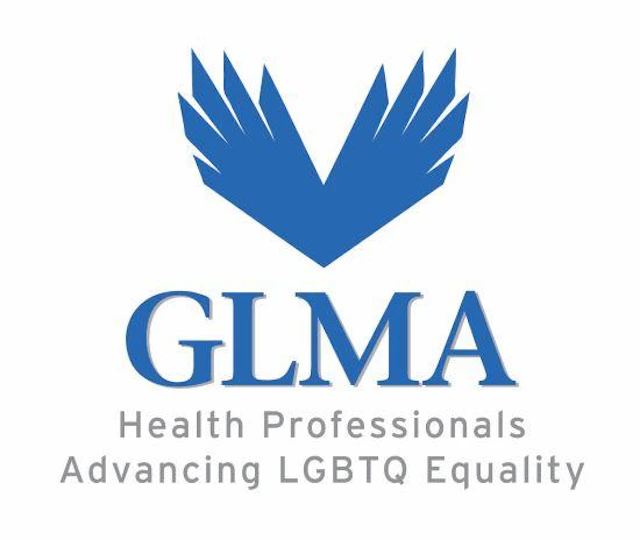
The Health and Aging team is partly funded by a grant from Pfizer, Inc.

Participate in The HEI 2026
Why Participate?
Learn best practices for LGBTQ+ equity and inclusion
Provide patient-centered care to a long-overlooked group
Take advantage of free online, on-demand staff training from expert sources that includes CME/CEU credits
Enhance patient satisfaction ratings
Ensure compliance with legal, CMS and The Joint Commission requirements
Improve quality and safety
Reduce risk of litigation, complaints and negative publicity
Reach out to a highly loyal market segment
Enjoy recognition for commitment to equity, inclusion & diversity from the nation’s largest LGBTQ+ civil rights organization
What Organizations are Eligible?
The HEI is intended for inpatient facilities that provide general medical and surgical care. However, specialty hospitals and certain outpatient healthcare facilities may request to participate in the HEI. Typically a facility or organization must have at least 100 employees to be eligible to participate.
The outpatient facilities that are eligible to participate include non-profit community-based clinic organizations such as FQHCs and FQHC look-alikes; public health department clinics; student health centers; LGBTQ+ and HIV specialty clinics; Planned Parenthood Affiliates and other reproductive and/or fertility health clinics; and other nonprofit or governmental organizations that prioritize meeting the healthcare needs of an underserved area or population.
Physician practices, medical groups, mental healthcare providers, and solo health practitioners are NOT eligible to participate in the HEI.
Love conquers hate.

Wear your pride this year.
100% of every HRC merchandise purchase fuels the fight for equality.





